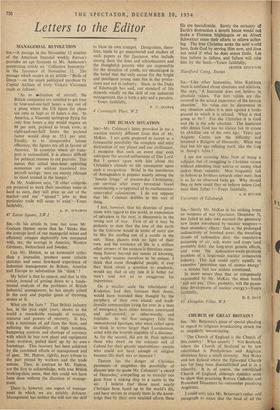THE HUMAN SITUATION SIR,'—Mr. Coleman's letter provokes in me a
reaction entirely different from that of Mr.
McKee. I am quite prepared to accept as a foreseeable possibility the complete and utter destruction of our planet and our civilisation.
I recognise that such an event May even anticipate the second millennium of Our Lord. But I cannot agree with him about the Christian's attitude to life consequent upon such a recognition. Belief in the imminence of Armageddon is popular mainly among the 'lunatic fringe' of present-day Christianity, our survival after every terrestrial brawl necessitating a re-appraisal of its mathematico- apocryphal calculations. I do not suppose that Mr. Coleman dabbles in this sort of thing.
I feel, however, that his doctrine of pessi- mism with regard to this world, in expectation of 'salvation in the next, is theocentric in the wrong sort of way. First of all it may be pedantic to state that the loss of this earth to the Universe would in terms of mere size be like the snuffing out of a candle in the sun. Since planets emit no light of their own, and the existence of life in a million other corners of the cosmos is therefore some- thing forever beyond our means of knowing, we tacitly assume ourselves to be unique. I think that most thoughtful people, if ever they think about a question so academic, would say that at any rate it is better for man's soul not so to exaggerate his importance.
On a smaller scale the inhabitants of Krakatao, had they foreseen their doom, would have bounded their thought by the periphery of their own island; and tradi- tionally,communities living for ever in a state of emergency have either become constricted and self-centred, or othcr-wordly and fatalistic. In the first category falls the outnumbered Spartiatc, who when called upon to think in terms larger than Lacedaemon, acted with the boorish stupidity of a dinosaur. As for the second, did not St. Paul upbraid .• those who dwelt on the volcanic soil of Colossi for their gnostic superstitions—people who could not have enough of religion because life itself was so insecure ?
Therein lies the danger of Christian pessimism—it magnifies the possibility of disaster into (to quote Mr. Coleman) a sword of Damocles,' compelling us to transfer our gaze from a sinking ship to a castle in the air. I believe that those most nearly Christian have faced up to the world's ills, and have striven to remedy them in the know- ledge that by their own unaided efforts these
Ills are ineradicable. Surely the certainty of Earth's destruction a month hence would not make a Florence Nightingale or an Albert Schweitzer cease their efforts to relieve suffer- ing. The true Christian seeks the next world here, finds God by serving Him now, and does not mind if what he does seems futile. Let him believe in failure, and failure will take him by the heels.—Yours faithfully,








































 Previous page
Previous page